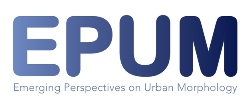EPUM OPEN LEARNING RESOURCES. The consortium developed an array of open access learning resources providing content for the Open Learning Curriculum (O1) and the Online Training Tools (O3). Some of the resources are collated from existing sources while others are developed for the project. The resources are designed to match the needs of the curriculum and to fit into the learning structure, as well as to work as stand-alone resources for use in existing educational modules.
The aim is to capitalize on expertise and subject-specific knowledge generated by all participants at different domains: urban form theoretical framework, urban form methods of analysis, public spaces, spatial configuration and social phenomena, and empirical studies. Furthermore, it is envisaged that the resources cover a wide range of formats and representations to meet educational standards and address the needs of different learning styles:
EPUM OPEN LEARNING CURRICULUM. The attempt to establish a shared learning space, linking the different approaches and bringing together researchers, educators and learners from the different institutions, geographical areas and approaches in the EPUM project, through the development of an open learning curriculum (OLC) in a blended learning environment, lies at the heart of this booklet.
EPUM brought together five partners from different countries in South and Central Europe that have been promoting different morphological approaches, aiming at comparing the theoretical, conceptual and methodological basis of the different approaches, identifying their main strengths and weaknesses, and exploring the possibilities to combine some of these different ways of describing, explaining and prescribing the physical form of cities through the teaching of urban morphology.
The consortium identified the need of collaborative learning spaces which will enable the exploration of the potential of combining and coordinating the different approaches while at the same time enabling the participation and collaboration of all relevant stakeholders in the debates about contemporary cities’ issues. The mode of learning which proved to be suitable for such a learning platform is one that facilitates both face-to-face activities, so as to allow institutions to work independently, with on-line activities which enable the synchronous or asynchronous collaboration and learning across institutional barriers; in other words, a blended learning approach in urban form studies.
EPUM COLLABORATIVE LEARNING WORKSHOPS. Large-scale learning activities of EPUM included two international intensive workshops, aimed at: bridging together both academic participants from the various institutions as well as academic with non-academic participants; bringing academia along with stakeholders, professional and local authorities; exchanging knowledge and information between approaches; achieving mutual understanding between the different approaches; facilitating combination and coordination of the different approaches. The workshops thus consisted of a combination of physical and virtual lectures, practical group learning and design tasks and critical discussions between learners and other stakeholders, including professionals, local authorities, local communities and organisations.


